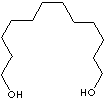PRODUCT IDENTIFICATION

TOXICITY
SMILES
CLASSIFICATION
Diol , Monomer
EXTRA NOTES
PHYSICAL AND CHEMICAL PROPERTIES
white crystals
SOLVENT SOLUBILITY
REFRACTIVE INDEX
> 110 C
EXTERNAL LINKS & GENERAL DESCRIPTION
GENERAL DESCRIPTION: Alcohols are very weak acids as they lose H+ in the hydroxyl group. Alcohols undergoes dehydration reaction which means the elimination of water molecule replaced by a pi bond between two adjacent carbon atoms to form alkenes under heating in the presence of strong acids like hydrocloric acid or phosphoric acid. Primary and secondary alcohols can be oxidized to aldehydes and ketones respectively. Carboxylic acids are obtained from oxidation of aldehydes. Oxidation in organic chemistry can be considered to be the loss of hydrogen or gain of oxygen and reduction to gain hydrogen or loss of oxygen. Tertiary alcohols do not react to give oxidation products as they have no H attached to the alcohol carbon. Alcohols undergoes important reactions called nucleophilic substitution in which an electron donor replaces a leaving group, generally conjugate bases of strong acids, as a covalent substitute of some atom. One of important reaction of alcohol is condensation. Ethers are formed by the condensation of two alcohols by heating with sulfuric acid; the reaction is one of dehydration. Almost infinite esters are formed through condensation reaction called esterification between carboxylic acid and alcohol, which produces water. Alcohols are important solvents and chemical raw materials. Alcohols are intermediates for the production of target compounds, such as pharmaceuticals, veterinary medicines, plasticizers, surfactants, lubricants, ore floatation agents, pesticides, hydraulic fluids, and detergents. 1,12-Dodecanediol, linear diol containing two primary hydroxyl groups at terminal locations for reaction of di-substitution, is used as a monomer and intermediate in organic synthesis including polyesters, polyurethane, elstomers, polymer crosslinkers, parmaceuticals. It is used as an emollient, humectant, and wetting agent in cosmetic and skin care products.
APPEARANCE
white flakes
C-12 DIOLS
99.0% min
1,12-DODECANEDIOL
98.0% min
MELTING POINT
79 - 84 C
LINEAR DOILS
|
Linear Diol |
CAS RN |
EINECS |
Melting point |
Boiling Point |
Formula |
Mole WT. |
|
Pentane-1,2-diol |
5343-92-0 | 226-285-3 |
|
206 C | CH3CH2CH2CH(OH)CH2OH | 104.15 |
|
Pentane-1,5-diol |
111-29-5 | 203-854-4 |
|
239 - 242 C | HO(CH2)5OH | 104.15 |
| Hexane-1,2-diol | 6920-22-5 | 230-029-6 |
|
223 - 224 C | CH3(CH2)3CH(OH)CH2OH | 118.17 |
| Hexane-1,6-diol | 629-11-8 | 211-074-0 | 38-42 C |
250 C |
HO(CH2)6OH | 118.17 |
| Heptane-1,2-doil | 3710-31-4 |
|
|
|
CH3(CH2)4CH(OH)CH2OH | 132.20 |
| Heptane-1,7-diol | 629-30-1 | 211-085-0 | 17-19 C | 259 C | HO(CH2)7OH | 132.20 |
| Octane-1,2-diol | 1117-86-8 | 214-254-7 | 36-38 C | 131 C at 10 mmHg | CH3(CH2)5CH(OH)CH2OH | 146.23 |
| Octane-1,8-diol | 629-41-4 | 211-090-8 | 58-61 C | 172 C at 20 mmHg | HO(CH2)8OH | 146.23 |
| Nonane-1,3-diol | 23433-07-0 | 245-660-2 |
|
|
CH3(CH2)5CH(OH)C2H5OH | 160.26 |
| Noname-1,9-diol | 3937-56-2 | 223-517-5 | 45-47 C | 288 C | HO(CH2)9OH | 160.26 |
| Decane-1,2-diol | 1119-86-4 | 214-288-2 | 48-50 C |
255 C |
CH3(CH2)7CH(OH)CH2OH | 174.28 |
| Decane-1,10-diol | 112-47-0 | 203-975-2 |
74 C |
|
HO(CH2)10OH | 174.28 |
| Undecane-1,2-diol | 13006-29-6 | 235-848-2 |
|
|
CH3(CH2)8CH(OH)CH2OH | 188.31 |
| Undecane-1,11-diol | 765-04-8 | 212-135-4 |
|
|
HO(CH2)11OH | 188.31 |
| Dodecane-1,2-diol | 1119-87-5 | 214-289-8 | 56-60 C |
|
CH3(CH2)9CH(OH)CH2OH | 202.33 |
| Dodecane-1,12-diol | 5675-51-4 | 227-133-9 | 79-81 C |
324 C |
HO(CH2)12OH | 202.33 |
PRICE INFORMATION